Ayesha Curry has a long list of accomplishments: actress, author and cooking television personality. And now she has her sights set even higher: helping one million Black women business owners.
Curry joined the board of Goldman Sachs’ “One Million Black Women” initiative, which will invest $10 billion in Black women-owned businesses and owners over the next 10 years. She has also hosted listening sessions with Black women business owners in the restaurant industry.
The goal? To help Black women business owners in various industries gain greater access to capital and have the tools to ensure their businesses survive past the pandemic.
“The pandemic … shattered the restaurant industry in general,” Curry told Know Your Value. “… Access to capital, especially right now, was so necessary and so important to not only keep these places afloat, but to … find that growth that we're all looking for.”
Other prominent Black women, including senior advisor to former President Barack Obama Valerie Jarrett, and former Secretary of State Condoleezza Rice, are on the project’s advisory council.
In many instances, Black-owned and Black women-owned businesses were growing exponentially before the Covid-19 pandemic hit. Black women were launching new businesses at greater rates than any other demographic between 2014 and 2019, according to American Express’s annual “State of women-owned businesses” report.
In that same timeframe, the number of female-owned businesses overall grew by 21 percent, but Black women-owned businesses grew by 50 percent according to the report.
And now in the aftermath of Covid-19, its many of these businesses that are trying to stay afloat. After all, Black entrepreneurs are typically over-represented in industries most affected by the pandemic, including the food, retail, and personal care industries.
Curry said joining this initiative is personal for her.
“I watched my mom build up her hair salon — she was a stylist for 40 years, a small business owner — and so I've seen that work ethic, and that strength behind that and it's something that I've carried with me through my own career,” Curry said.
She’ll be supporting Black women in the restaurant industry in the greater Oakland, Calif., area with a focus on helping those women promote food security and have greater access to capital. She’ll be working alongside women like chef Reign Free, who owns Red Door Catering in Oakland and recently launched the Black Culinary Collective, to help fellow Black entrepreneurs, too.
Meeting the moment
After George Floyd’s murder last summer, Black-owned businesses saw a massive spike in support — financial and otherwise — but that has slowed in some ways since. Black-owned businesses are navigating a new reality like other entrepreneurs, but these confounding dynamics and unique historical challenges they’ve faced have the potential to threaten their economic standing for years to come.
Goldman’s effort is just one way companies are trying to meet the moment. The “One Million Black Women” initiative — which will focus on areas like small business, healthcare, housing, and education — plans to disburse the money through equity and grants with the goal of “narrowing their opportunity gaps.”
Jarrett told Know Your Value that what has surprised her since joining the project is “the talent is there. What’s missing is opportunity.”
The investment, Jarrett said, has the potential to have widespread effects. “There is a ripple effect when you help a Black woman-owned business that is located in a community where jobs are hard to find.”
The biggest obstacle for Black women who want to start a business is funding and resources, said Angela Randolph, an assistant professor in entrepreneurship at Babson.
“I do a lot of work with Black women entrepreneurs, and that typically is their biggest fear. [M]ost entrepreneurs find funding for businesses is usually through friends and family. And typically, for Black women in particular, there may be less access to the amount of money you need going through friends and family,” she added.
It’s also vital that not only are resources available to help Black women maintain and grow their businesses, but making sure that information is shared and accessed widely.
“When you have major Wall Street firms saying we want to bet on Black women and we think it’s a good investment — and the fact that the majority of their dollars are investment dollars, not grants — sends the message that this makes good business sense,” Jarrett said. “Others will follow their lead.”
